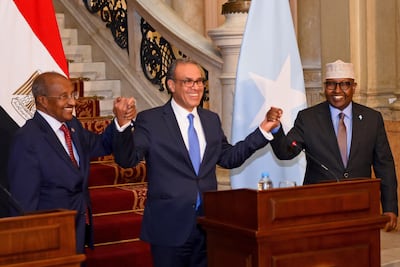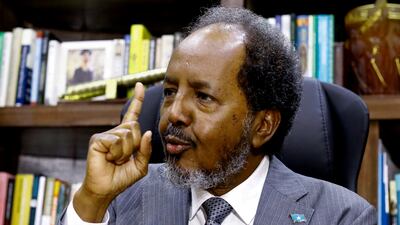Somalia and Ethiopia are set to restore full diplomatic relations after a visit by Somalia's President Hassan Sheikh Mohamud to Addis Ababa, as efforts intensify to heal a year-long rift that threatened further instability in the Horn of Africa.
Mr Mohamud and Ethiopian Prime Minister Abiy Ahmed “agreed to restore and enhance their bilateral relations through full diplomatic relations in their respective capitals”, they said in a joint statement on X.
Land-locked Ethiopia's desire for access to the sea had deepened long-standing grievances between the two neighbours. Somalia was outraged when Ethiopia signed a deal one year ago with its breakaway region of Somaliland, reportedly to recognise its independence in exchange for a port and military base on the Red Sea. Ethiopia's ambassador in Mogadishu was expelled in April last year and the countries broke off diplomatic ties.
The row was defused by a peace deal last month, mediated by Turkey and signed by both leaders. During Mr Mohamud's visit to the Ethiopian capital Addis Ababa on Saturday they reiterated their commitment to the deal and its “spirit of friendship and solidarity”. They also discussed deepening trade and security co-operation against “extremist militant groups”.
Many questions remain unresolved. Although Turkish President Recep Tayyip Erdogan said last month's deal would eventually give Ethiopia some type of sea access, it is not clear what form this would take. The fate of Ethiopia's deal with Somaliland is also uncertain.
Hours before Saturday's presidential visit, Somalia's Foreign Minister Ahmed Moalim Fiqi met his Egyptian and Eritrean counterparts. The three countries have found common ground in opposing Ethiopia's ambitions and made a veiled reference to their rival.

“The Red Sea and its security is subject only to the will of the countries on its coast, and it is absolutely unacceptable for any country not bordering the Red Sea to have a presence, whether military, naval or otherwise,” said Egypt's Foreign Minister Badr Abdelatty.
Egypt, Eritrea and Somalia forged a new regional alliance in October at a summit in the Eritrean capital Asmara, and the foreign ministers said on Saturday that more would follow.
Shared concerns about Ethiopia have also pushed Egypt and Somalia into closer military ties. Egyptian troops have joined the African Union Support and Stabilisation Mission in Somalia, an updated international coalition to fight Somali extremists that is scheduled to be launched this month.
Cairo has been embroiled in a long dispute with Addis Ababa over the latter's construction of a dam on the Blue Nile, by far the river's largest tributary. Downstream Egypt and Sudan say the nearly-complete dam threatens their share of the river's water, with Cairo insisting it poses an existential threat to its 107 million people.
Mr Abdelatty also discussed with the two ministers the civil war in Sudan, a 20-month-old conflict in which Egypt and Ethiopia are on opposing ends.
Mr Abdelatty said his country, Eritrea and Somalia would be providing training to the Sudanese Armed Forces in its fight against the paramilitary Rapid Support Forces, whose actions he described as “terrorism”.
Since the start of the new year, Egypt's Foreign Ministry has intensified its diplomatic engagement in several African countries, with Mr Abdelatty conducting a series of phone calls with counterparts from Guinea-Bissau, Congo, Kenya, Cameroon, Chad and Djibouti.
Mr Abdelatty reaffirmed Egypt's willingness to engage in economic projects with Horn of Africa nations and its commitment to maintaining the “integrity and unity” of the region.
Analysts say the increased engagement is a bid by Egypt to enhance its regional influence and address concerns related to the Grand Ethiopian Renaissance Dam. Egypt has sought to sign a binding deal with Ethiopia over the operation of the dam, a demand which has been rejected by Ethiopia.
– With agencies


